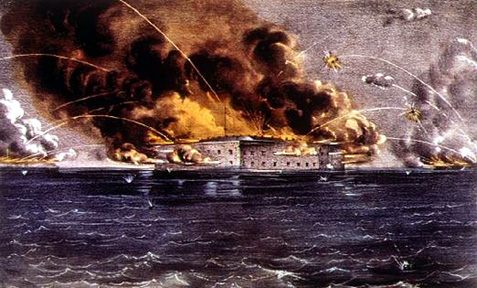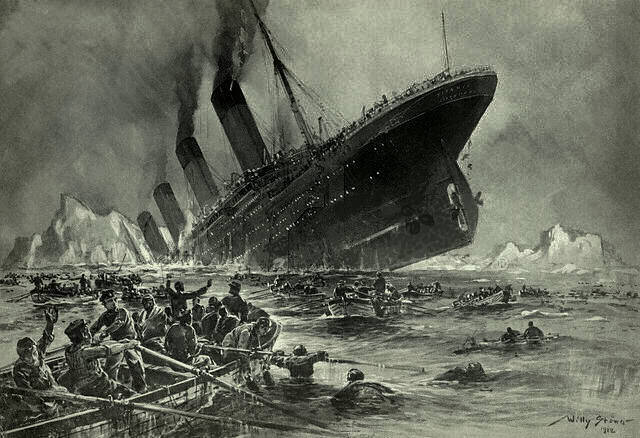There is always much to learn from quotes and their historical significance. Read on for a collection of quotes and general history from April 11th – 17th.

April 11, 1947
“I do not care if the guy is yellow or black, or if he has stripes like a fuckin’ zebra. I’m the manager of this team, and I say he plays. What’s more, I say he can make us all rich. And if any of you cannot use the money, I will see that you are all traded.”
– Dodgers Manager Leo Durocher
Jackie Robinson signed his first Major League Baseball contract with the Brooklyn Dodgers on April 11, 1947. Dodgers President Branch Rickey and National League President Ford Frick also signed the contract calling Robinson up from the minor league Montreal Royals. Four days later, Robinson broke the MLB color barrier when he started at first base on April 15th! He faced racial tension from both teammates and opponents but persevered to win Rookie of the Year and went on to lead a successful 10-year MLB career. In 1997, Robinson’s number 42 was retired across all MLB teams, making him the first professional athlete in any sport to be so honored.

April 12, 1961
“Off we go! Goodbye, until [we meet] soon, dear friends.”
– Yuri Gagarin
On April 12, 1961, Russian cosmonaut Yuri Gagarin became the first person to journey into outer space! As the first human spaceflight, the Vostok 1 mission marked another major milestone in the Space Race. The flight completed one full orbit around Earth, lasting 108 minutes. The achievement quickly made Gagarin an international celebrity and he was awarded his nation’s highest honor: Hero of the Soviet Union. Less than a month later, Alan Shepard became the first American in space aboard the suborbital Freedom 7 mission on May 5th. However, it took much longer for the United States to match the Soviets’ accomplishment with John Glenn’s Friendship 7 orbital flight on February 20, 1962. Today, April 12th is celebrated as the International Day of Human Spaceflight in commemoration of Gagarin’s first flight!
Fun fact: April 12th also marks the date of the first Space Shuttle launch, Space Transit System-1 (STS-1) in 1981.
April 13, 1861
“Sir—Having defended Fort Sumter for thirty-four hours, until the quarters were entirely burned, the main gates destroyed by fire, the gorge wall seriously injured, the magazine surrounded by flames, and its door closed from the effects of the heat, four barrels and three cartridges of powder only being available, and no provision but pork remaining, I accepted terms of evacuation, offered by Gen. Beauregard, being the same offered by him on the 11th inst., prior to the commencement of hostilities, and marched out of the fort Sunday afternoon, the 14th inst., with colors flying and drums beating, bringing away company and private property, and saluting my flag with fifty guns.”
– Robert Anderson, Major First Artillery
The United States Army surrendered Fort Sumter to the South Carolina militia on April 13, 1861, concluding the first battle of the American Civil War. South Carolina had seceded from the union on December 20, 1860, and demanded the U.S. Army hand over its facilities in Charleston Harbor. However, the United States government refused to recognize the Confederacy, and its attempts to resupply Fort Sumter were fired upon. This led the situation around Fort Sumter to increasingly resemble a siege until the South began bombardment on April 12th. Although there were no casualties on either side, the battle strengthened the resolve of both North and South leading to the formation of the Union and Confederate Armies.

April 14, 1865
“Sic semper tyrannis! (Thus always to tyrants) The South is avenged!”
– John Wilkes Booth
On April 14, 1865, Abraham Lincoln was assassinated while attending the play Our American Cousin at Ford’s Theatre in Washington, D.C. by well-known stage actor John Wilkes Booth. Lincoln died the following day from the gunshot wound to the back of the head. He was the first U.S. president to be assassinated. Booth intended Lincoln’s death as part of a larger conspiracy to revive the Confederate cause near the end of the American Civil War. Co-conspirators were assigned to kill Secretary of State William H. Seward and Vice President Andrew Johnson but both survived. Booth was killed after a 12-day manhunt and 8 other conspirators were convicted, including Mary Surratt who became the first woman executed by the U.S. government.
April 15, 1912
“The story of the Titanic’s first and last voyage is one that has to be told anew in every generation, lest men forget the workings of fate and chance.”
– Arthur C. Clarke, Imperial Earth
RMS Titanic sank on April 15, 1912, after hitting an iceberg during her maiden voyage from Southampton to New York City. More than 1,500 of the estimated 2,224 people aboard died in the sinking. As the largest ship ever at the time, the Titanic was thought to be unsinkable and only carried lifeboats sufficient for half the number on board. Worse still, many of the lifeboats were only half-filled during the sinking. The disaster and huge loss of life were met with worldwide shock and led to major improvements in maritime safety. With so many depictions in popular culture, like the movie Titanic, it has become one of the most famous ships in history.

April 16, 1962
“As anchorman of the CBS Evening News, I signed off my nightly broadcasts for nearly two decades with a simple statement: ‘And that’s the way it is.’ To me, that encapsulates the newsman’s highest ideal: to report the facts as he sees them, without regard for the consequences or controversy that may ensue.”
– Walter Cronkite
On April 16, 1962, Walter Cronkite began anchoring the CBS Evening News. He continued as anchorman for 19 years becoming an icon in television news and an opinion poll named him “the most trusted man in America”. During his tenure, Cronkite reported many major events including JFK’s assassination, the Vietnam War, Watergate, and the Iran Hostage Crisis. He also provided extensive coverage of the U.S. Space Program and was the only non-NASA recipient of the Ambassador of Exploration Award. Walter Cronkite stands out among anchormen for his commitment to objective journalism and his departing catchphrase, “And that’s the way it is”, followed by the date of the broadcast.
April 17, 1975
“When the Khmer Rouge reached Phnom Penh, the first thing they did was to evacuate the population. Then they took over. The point of a revolution is to bring justice to the people, so even if you don’t have proof of sabotage, you manufacture it.”
– Rithy Panh
The Khmer Rouge captured Phnom Penh on April 17, 1975, effectively ending the Cambodian Civil War. The United States-supported Khmer Republic had controlled only a small region around Phnom Penh since the beginning of 1975 and could only receive supplies via airlift. Once the city fell, the remaining Khmer Republic forces were executed and the population was forced out to work in the countryside. This ultimately led to the death of 1.5 to 2 million people during the Cambodian genocide under Pol Pot’s communist regime. The Fall of Phnom Penh is depicted in the film The Killing Fields.
In case you missed last week’s quotes, see History April 4th – 10th.
To never miss a Quill Quotes post, please subscribe via email and/or follow us on social media!
Excellent quotes! Thanks for sharing!
♥ Mae
Another wonderful post full of thought-provoking quotes. Thanks for sharing these precious pearls of wisdom.